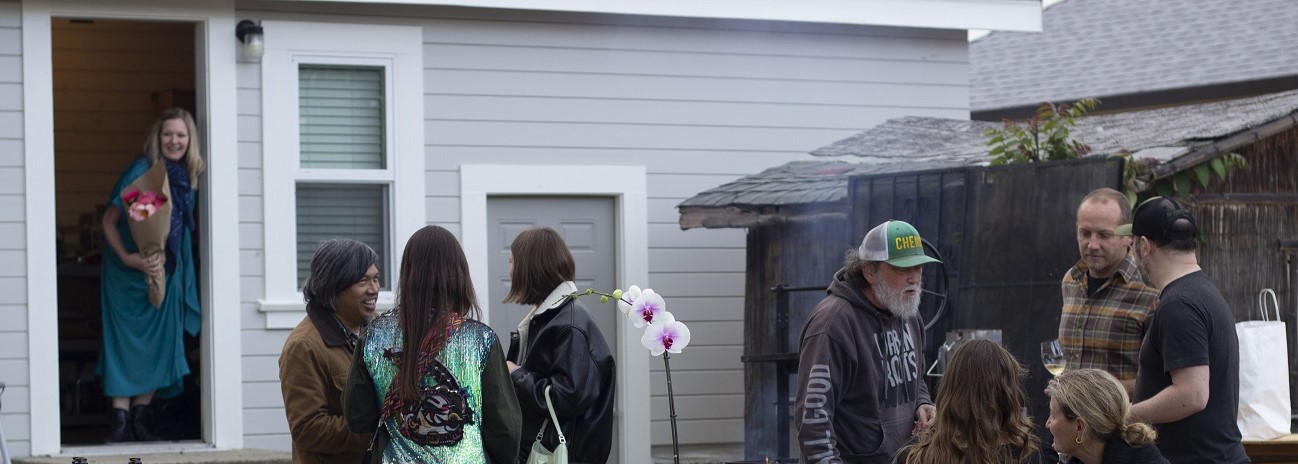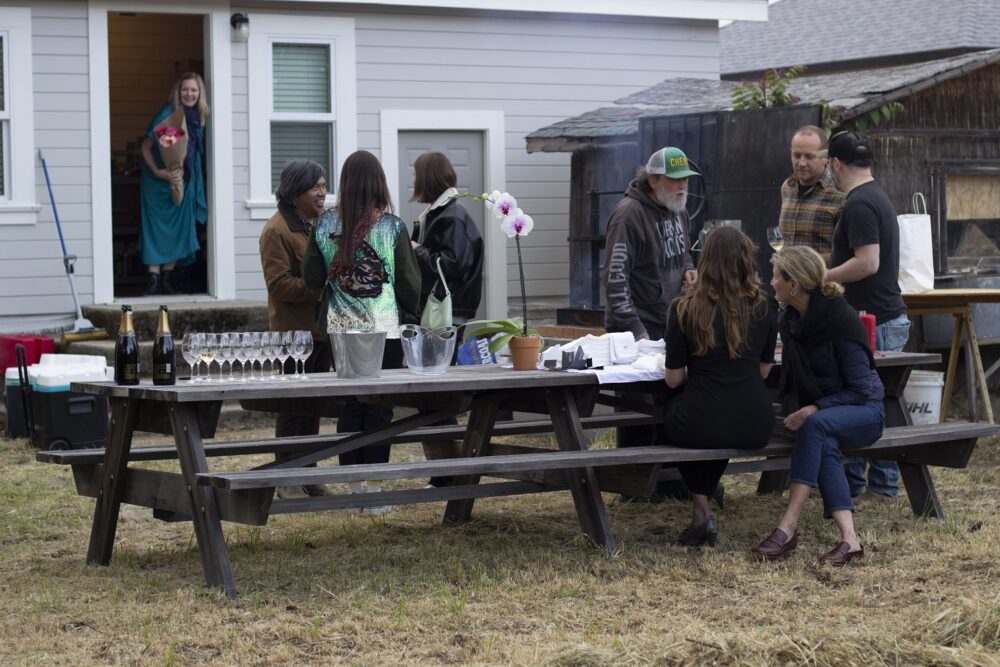
Lodi
It’s late spring when I visit Lodi, but low-hanging gray clouds blanket the sky above. Brief rainstorms have been traveling through town since I arrived earlier this afternoon, and I will be reminded by local farmers throughout my stay that this was a particularly wet year for Lodi.
I’m here to meet Melinda Kearny and Michele Ouellet, the mother and daughter team behind the Napa Valley-based wine brand Lorenza, which sources most of its fruit from Lodi.
I’ve arrived a few hours early, so I drive around for a bit. We’ve all heard the song, memorized the lyrics; Oh, Lord, stuck in Lodi, again. John Fogerty, who was only 23 years old when he wrote “Lodi,” later explained in his memoir Fortunate Son: My Life, My Music that he felt the place was actually “very warm and special.”
I park on West Pine Street and stand briefly in front of a picturesque row of houses, one of them supposedly where Cesare and Rosa Mondavi, an immigrant grape packer and his wife, raised their sons, Robert and Peter. Robert Mondavi graduated from Lodi Union High School in 1932 where he was class president and the football team’s MVP. Later, after finding success with the eponymous winery he founded in the Napa Valley in 1966, he opened Woodbridge in 1979 in his hometown of Lodi, where he believed solid, delicious wines for the everyday could be produced. He wasn’t wrong.
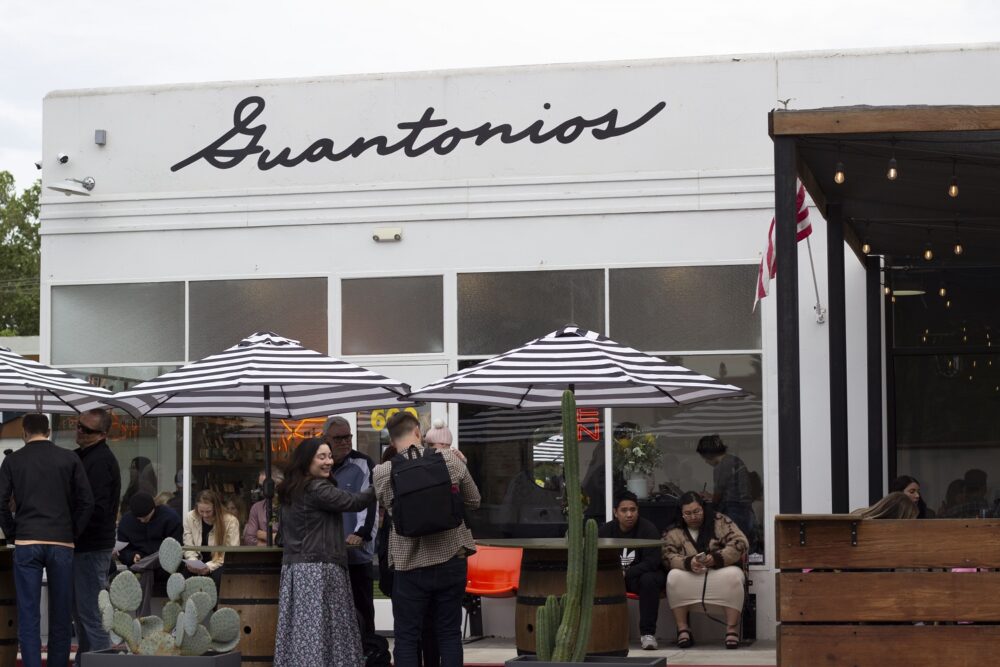
Guantonios Wood Fired in Lodi
I head over to Guantonios Wood Fired, where I’m to meet with the mother-daughter team. There’s a line forming outside the eatery, which used to be a service station. They don’t take reservations, and according to Mike, a local who’s seated out front waiting for his wife and young son to join him, “It’s the best restaurant in town. For sure.” He tells me he’s a foodie and that he’s just back from Mexico City, where he describes a vibrant and bustling food scene. Soon we’re surrounded by locals, all vying for a table.
Marissa Guantone opens up shop, as her husband Nick, in a baseball cap, work shirt, and apron, lights a candle, places it in the guest bathroom, and joins her in preparing for dinner service. Together with Nick’s parents, they own Guantonios, which they opened just before the pandemic. The menu is divided charmingly into two simple sections: Not Pizza and Pizza. The Not Pizza offerings include a delicious, savory chickpea hummus with olive oil and flatbread and an array of marinated olives served very cold with citrus, garlic, and herbs. Refreshing and balanced, they prepare the palate for pizzas to come, which include the Cacio e Pepe, the Burrata, and the Mushroom (shiitake, crimini, oyster), to name just a few. Adventurous diners can ask for their pizzas “Nick’s Way,” which includes an addition of hot honey and ricotta.
Their wine selection is small and purposeful, highlighting numerous California producers who source fruit in Lodi: Lady of the Sunshine, Hammerling, Maitre de Chai, Stirm, Sandlands, Las Jaras, Tessier, Union Sacre, Fine Disregard, Lorenza, and a handful of others. Indigenous yeast is the through line between the wines they’ve selected and Chef Nick’s pizzas. “We like to showcase wines that are like our pizzas. Natural…where natural yeast is important to the development of flavor.” Avoiding commercial yeasts, the Guantones feed their starter, which they call “mother,” daily and attribute the excellent texture and flavor of their pizzas to “her,” as well as their use of organic/non-GMO flour. When Kearny and Ouellet arrive, we take a seat at a counter just in front of the kitchen so that we can watch our pizzas being made.
They started Lorenza together in 2008, when Ouellet was just shy of 21 years old and had already been working for years as a professional fashion model. “We’re a very small company, so we wear all the hats, from production to marketing to selling, so I do a lot of creative direction for the brand. Working in the fashion industry for so long, I’ve learned a lot over the years. Working with amazing photographers, art directors, and designers, we’ve always had a bit of a different sensibility. We’ve always wanted our brand to feel very fresh and fun,” Ouellet says.
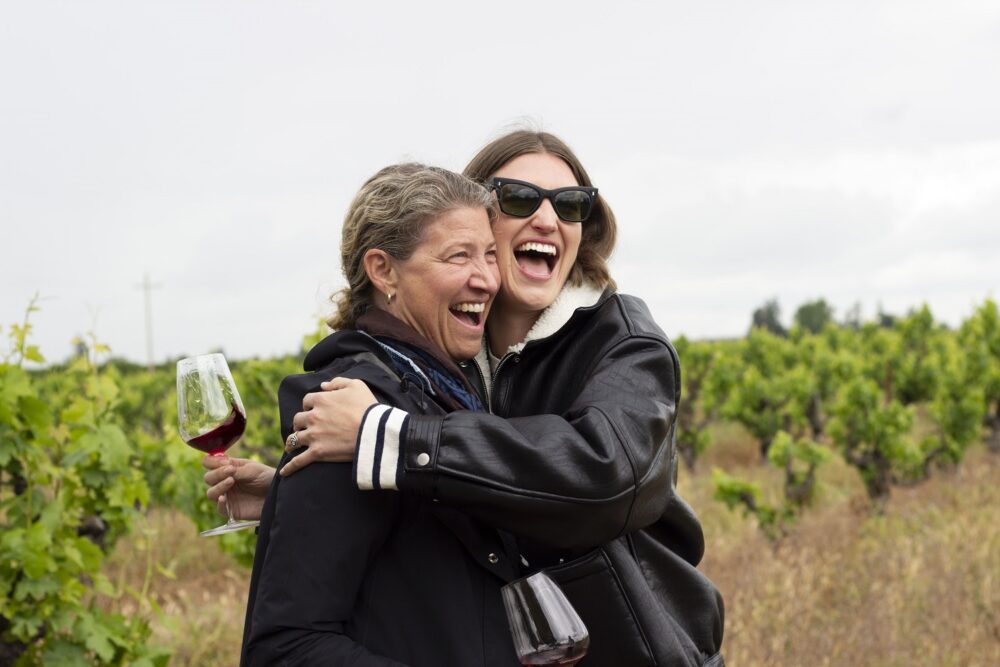
Mother-daughter team Melinda Kearny and Michele Ouellet of Lorenza
Ouellet, 35, credits Lorenza with having given her a greater sense of agency in life. “That was part of why we started Lorenza together. The fashion world is very fickle. Your destiny is not in your hands, necessarily. It’s all about what other people think of how you look, so you really don’t have all that much control over things. So my mom and I wanted to do something together where we could really be creative, work together, be connected with nature, and it was an opportunity for me to use my voice because, as a model, you’re really meant to show up, do what you’re told, embody someone else’s vision, and I really enjoy that side of my career as well, but this is a nice balance to that. This has made me a businesswoman from a very young age.”
The tables continue to turn around us, with new diners arriving as others set to leave. We wrap up at Guantonios before too long, as we’ve been invited to a last-minute dinner party at the Victor Book Club.
The Victor Book Club
The town of Victor is just under five miles outside of Lodi. There is not much to distinguish it from other similarly small, economically challenged ag towns like Escalon and Manteca.
The writer Kurt Sutter (Sons of Anarchy) has said the fictional town where the show is set is located somewhere in San Joaquin Valley, between Lodi and Stockton. When I meet up with farmer and winemaker Tegan Passalacqua, our dinner host and the founder of the Victor Book Club, he echoes this. “This is the town they say inspired Charming.”
Only about 215 people live in Victor, in farmhouses in varying stages of disrepair, with backyards barely protected by old, dilapidated fences. There’s a small deli, a mechanic’s shop, a post office, a concrete contractor, a welder, and a few other mostly service-oriented storefronts. Passalacqua has purchased the former butchery and hopes to someday turn it into a winery.
Passalacqua’s Victor home is modest – gray against a gray sky, with a dried-grass stubble covering the front yard, which is enclosed in cyclone fencing. When we arrive, the party is out back, with just a few people inside, Passalacqua included, prepping for dinner. There’s a menu of what we’ll be eating tonight taped to the wall, the doorway near it still missing a frame. “The house was built in 1912, I purchased it in 2015,” he tells me. “My father and I have remodeled the house, all new plumbing, new roof, insulated, new windows, new trim and baseboards, all new dry wall, new bathroom, had the original Douglas fir floors refinished.” As with most renovation projects, there is always more to do. Currently, he and his father are working on the wine cellar under the house.
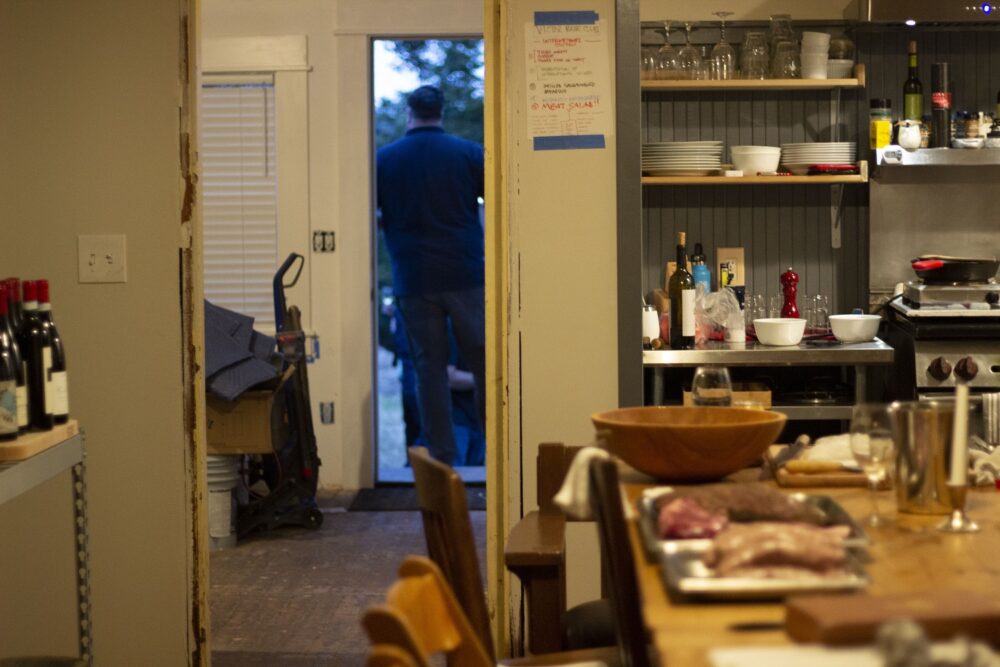
Tegan Passalacqua checking on his guests
Tall, with broad shoulders, he’s physically imposing, but there’s a gentleness about him. He sports an old-timey 1950s haircut and frequently flashes an easy, jovial smile. Passalacqua founded the Victor Book Club in 2021. During the course of a book club evening, dinner will be shared and books on wine and agriculture will be read from, however briefly, by Passalacqua.
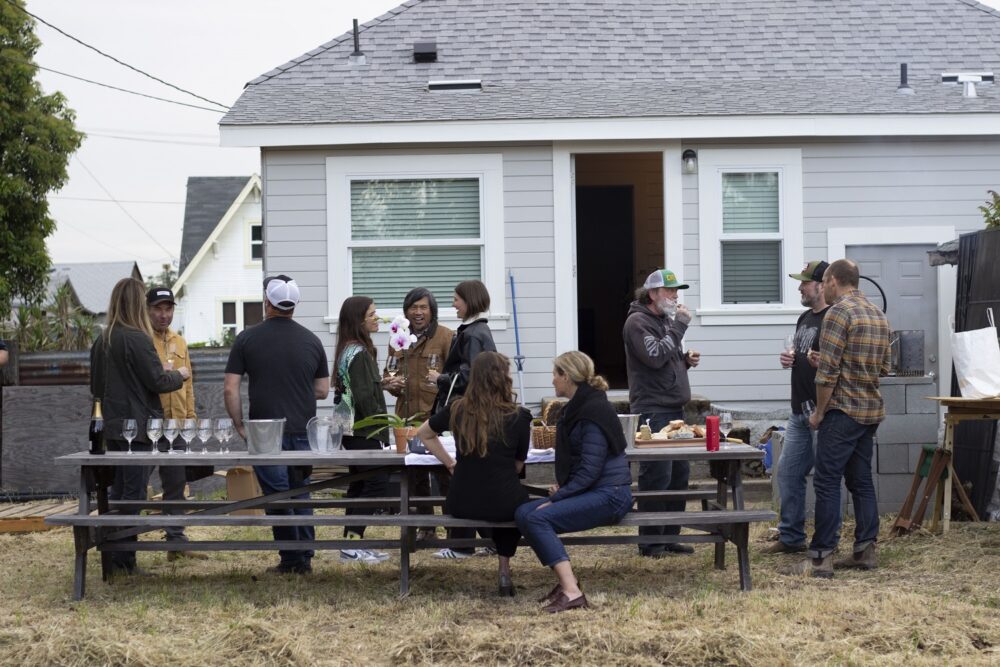
The party out back
Out back, the backyard fence is in disrepair. Some of it is plywood, some of it old boards, barely hanging on. Parts of farm equipment, rusted, lay about. The BBQ pit is made of cinder blocks. Adi Badenhorst, winemaker at South Africa’s iconic Badenhorst Family Wines, shows up in a John Deere cap. He takes a long pull from a beer. Cristiana Tiberio, visiting from Italy, brings her eponymously named wines to share. Her Cerasuolo D’ Abruzzo will later become wine of the night, but for now, we all gather outside, occasional raindrops marking the wood table where champagne flutes sit.
Passalacqua tries to host these evenings when special guests like Badenhorst or Tiberio blow through the state. He says he enjoys “spending time with folks of different backgrounds who have some of the same interests. It feels to me that we are away from the hustle and bustle of the outside world, and we are able to focus on each other.”
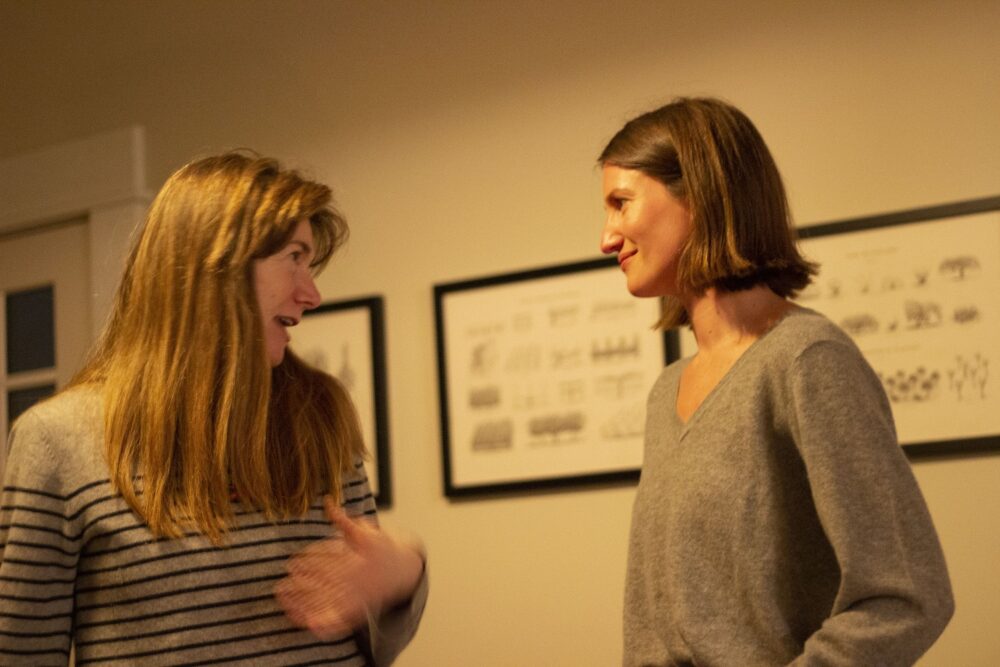
Christiana Tiberio chatting with Michele Ouellet
Perhaps best known for his work with Turley Wine Cellars, where he became vineyard manager in 2003 before adding the winemaker role to his title in 2013, Passalacqua also helms his own well-regarded wine project, Sandlands. It’s a deeply personal project that focuses on classic California grape varieties that fell by the wayside over the years as other more mainstream varieties gained popularity. He likes working with vineyards grown in decomposed granite (sand), and his lineup includes Carignane from Lodi and Mataro from San Benito County, among other outsider offerings. “I started coming to Lodi in 2003 for Turley,” he tells me. “I soon fell in love with the place. I started to source more grapes for Turley, and in 2010 I purchased some Zinfandel from the Schmeidt family in Victor. The wine we made really blew me away. It was floral and spicy and red-fruited. Through some luck, I ended up purchasing the vineyard next to the Schmeidt vineyard from the Kirschenmann family in 2012. It’s a 20-acre piece with 15 acres of own-rooted Zinfandel planted in 1915. I sell grapes to Turley, Bedrock, Arnot Roberts, Pr20-acre, and I make some for Sandlands as well. I then fell in love with the house down the road, one mile away.” The house in which we stand. “I have purchased and am planting a vineyard in Amador County outside the town of Volcano. It’s at 2800 feet elevation in volcanic soils. The Victor house has been a great in-between for this project as well.”
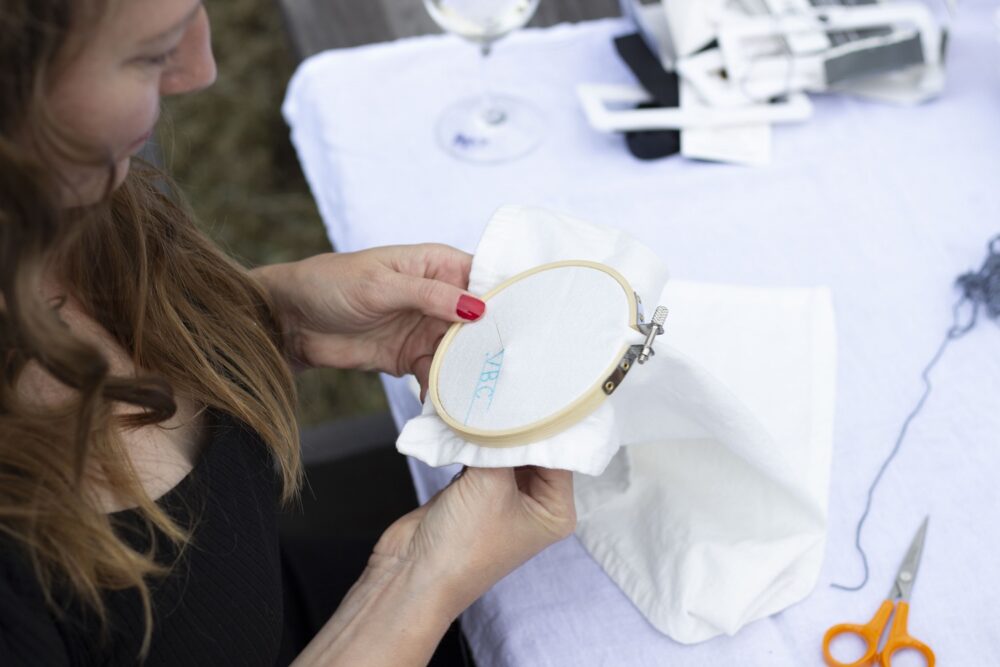
Dr. Stephanie Bolton
Though she was performing needlepoint when I arrived – stitching “VBC” onto white napkins as keepsakes for the dinner guests – Dr. Stephanie Bolton now readies herself for dinner. The Director of Grower Communications and Sustainable Winegrowing for the Lodi Wine Commission, Bolton is a regular guest here. “I’ve found that I can really be myself in Tegan’s home with the crowd that gathers there, and I think others feel the same way,” she says. “Having the record player and being in a home without a microwave or television adds to the nostalgia that many of us long for. A simpler time where just gathering around a table with each other is more than enough to bring us pleasure. We genuinely like each other and have fun together. Many people in Lodi have lived here for generations, and they truly understand the need to work together to succeed. You really can’t do farming alone. I’ve lived all over the world and have never experienced such a kind, accountable community. You learn quickly that you don’t want to say anything rude or unkind here, because it’s likely that the person whom you are talking with is somehow connected to whatever or whoever you are speaking about! I’ve even learned to drive slower, because it’s likely that I know the people on the road, and I don’t want them to think I’m an inconsiderate driver.”
Later, when we all sit down to eat, Badenhorst and Tiberio will speak about the wines they’ve brought, and, later still, we’ll all sit by candlelight while Tegan brings some wines out of his cellar, wines from California dating back to the early 70s and some even older.
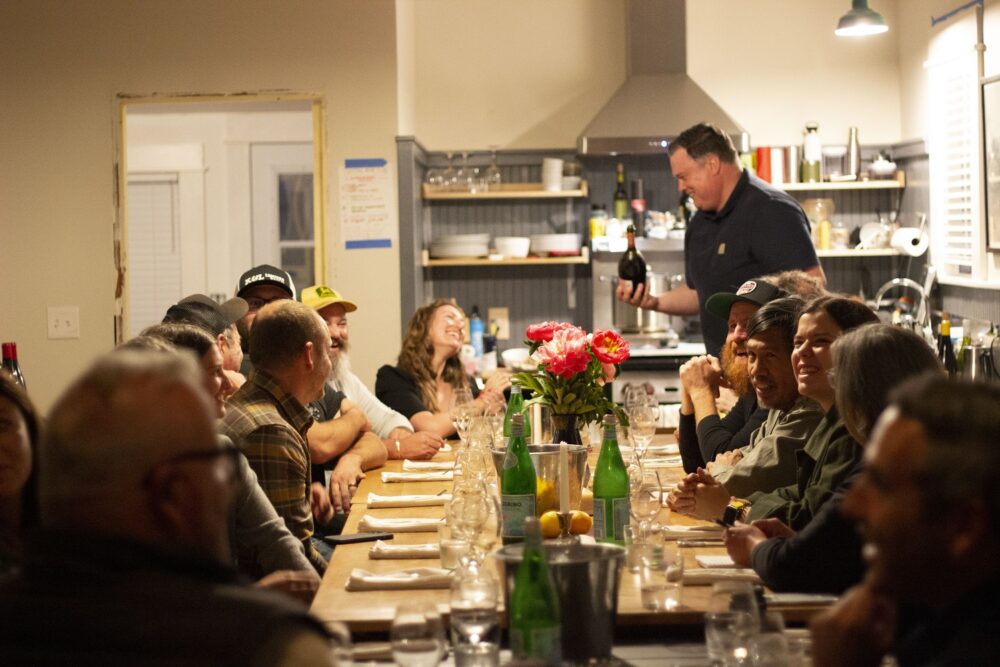
Dinner with the Victor Book Club
Lorenza
The next morning, we rise early. I’ll be shadowing Kearny and Ouellet as they check in on the vineyards with which they work. The day is cold and wintry, and as we arrive at Bechthold Vineyard, the oldest continuously farmed vineyard in the appellation, we have a hard time getting out of the car for all the mud surrounding us. The climate here is typically Mediterranean, the Sacramento-San Joaquin River Delta providing the greatest climatic influence. Deep, sandy, well-drained loam comprises the soil profile. Aged, gnarled, head-trained and own-rooted vines, still vital, surround us on all sides. They look nearly prehistoric, perhaps for good reason. The vineyard was planted in 1886, and though some replacement vines have taken root after some older vines aged out, it is one of the oldest Cinsault vineyards in the nation.
Kearny is eager to try her first Lorenza Cinsault at the site of its provenance, so she pours a little for each of us out of lab sample bottles. By the time this article goes to print, the wine will be in-market. Crunchy, fresh, balanced, with great natural acidity and length, it’s a refreshing, invigorating young wine. Kearny, a former restauranteur and successful wine marketer, heads up winemaking at Lorenza and has expanded their portfolio to include Picpoul Blanc and Cinsault. “In 2021, the amount of fruit was so small, and I didn’t have a crusher or press small enough, so we destemmed by hand. This is basically free run delicately handled. When it came time to press, we just drained it. Did a little foot-treading, but it’s just a very delicate expression of this vineyard. It’s our first [Cinsault], and I love the aromatics.” Strawberry. Rhubarb. Cardamon. White pepper. “It’s aged in stainless and neutral barrels,” she adds.
“We feel honored to be a very small part of this vineyard,” Ouellet says. “We’ve been lucky to work with this vineyard for over a decade, so that’s just a tiny part of its history, but it feels like a privilege and honor,” Kearny adds, “It’s always held a small, but powerful portion of our Rosé blend. It gave our Rosé some gravitas. This vineyard gives our Rosé a more elegant, pear-like quality.” With the Cinsault, she says, “it holds a different place in the spectrum of red wine. It’s on the lighter side.” She is also quick to add that the Bechthold Vineyard is farmed organically. “When we visit and migrate through, there’s a feeling we get with this vineyard, like, ‘Hello, friend. We’re happy to be here and how are you doing this year?’” Her daughter adds, “It’s very grounding.” The vineyard is teeming with life; all around us is birdsong, and we spy a few ladybugs on this cloudy day.
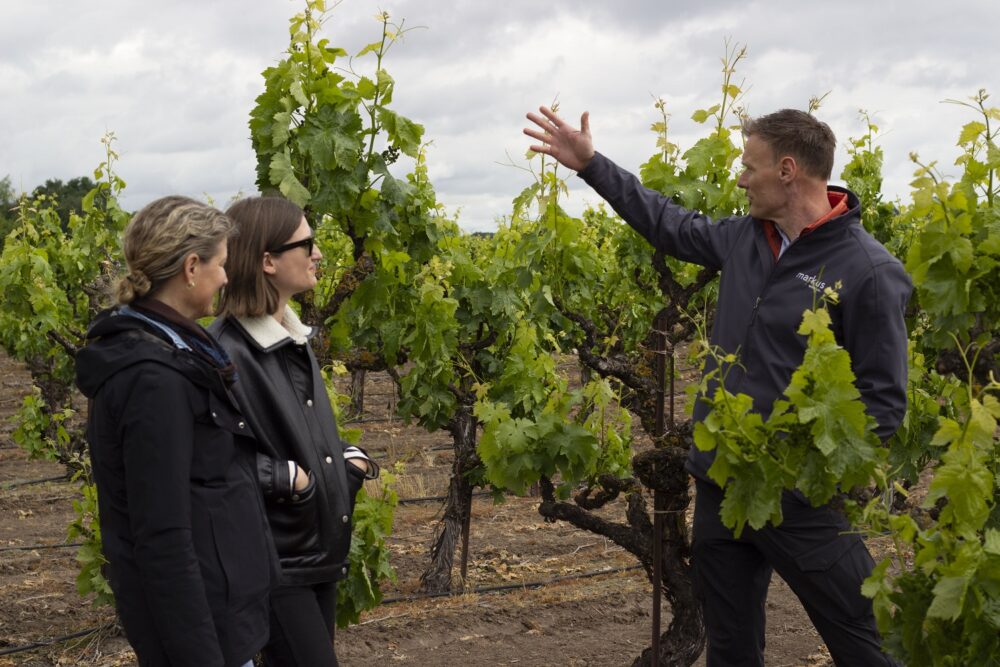
Kearny and Ouellet with Markus Niggli of Markus Wine Company
Next up, we head out to Nicolini Ranch, where we meet up with vineyard manager, Swiss-born Markus Niggli. Niggli, who has his own brand, Markus Wine Company, is the steward of this Heritage Vineyard Society certified block we’re now standing in. Tall and tanned, Niggli favors natural wines and ancient vines. Planted in 1936, the still vital Nicolini Ranch vineyard is planted mostly to old, head-trained Carignane, and more than a few vines tower above us as we walk through the primitive rows.
Next, we make our way out to the Clement Hills area of Lodi, where we park at Bokisch Winery. It’s where Lorenza sources its Picpoul Blanc, but the rain is coming down hard now, so instead of walking the vineyard rows, we resolve to park the car and sip Picpoul Blanc as a chill sets in. Minerally, vibrant, with a hint of lime zest and oyster shell, it’s a lively white wine, sophisticated yet approachable.
We end our day at Thai Spices Restaurant, off Turner Road in an unassuming strip mall. Kearny and Ouellet are regulars. They say hello to the Thai owner, who is watching Top Chef on a small television set as we enter. “She’s always watching cooking shows,” Kearny says. The mother-daughter team have chosen well; the food is remarkably fresh, the flavors balanced. We hold bowls of green curry to get warm and talk about everything other than wine, and soon I’m headed back home.
